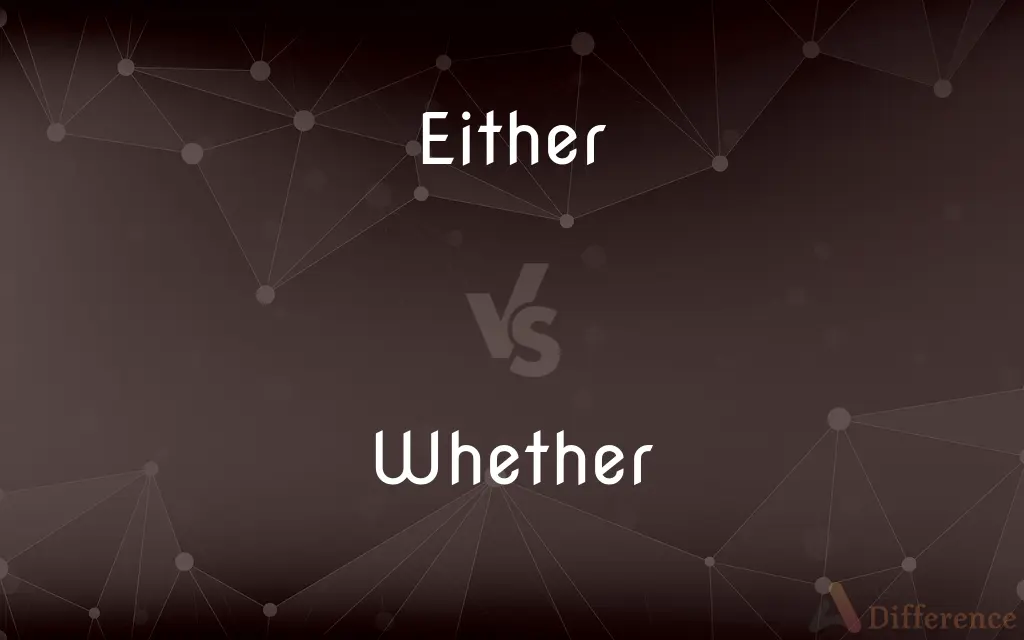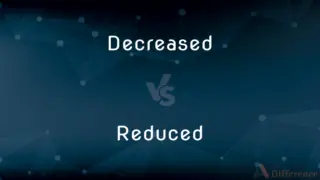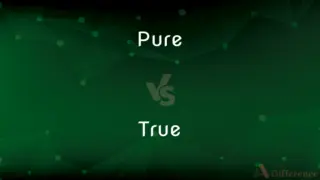Either vs. Whether — What's the Difference?
By Tayyaba Rehman — Updated on October 23, 2023
"Either" is used to indicate one of two options, while "whether" introduces alternatives or expresses uncertainty.

Difference Between Either and Whether
Table of Contents
ADVERTISEMENT
Key Differences
"Either" and "whether" serve different functions in English, though both relate to choices or alternatives. "Either" typically operates as a determiner or pronoun, highlighting one of two distinct choices. For example, in "You can have either coffee or tea," the word 'either' emphasizes the mutual exclusivity of the two beverage options.
Conversely, "whether" serves primarily as a conjunction, introducing indirect questions or expressing doubt between two or more alternatives. For example, "I'm unsure whether to go or stay" illustrates this uncertainty. Unlike "either," which often underscores a binary choice, "whether" can introduce more than two options, especially when paired with the word "or."
Additionally, "either" can also be used in negative structures to mean "neither" or "not in either case." For instance, "I don't like either option" implies a dislike for both presented choices. "Whether," on the other hand, does not have this flexibility in negative constructions.
Furthermore, "either" can be paired with "or" to present two choices, while "whether" is often paired with "or" to present alternatives in indirect questions. This subtle difference emphasizes the nature of "either" as presenting clear-cut options and "whether" as introducing uncertainty.
Comparison Chart
Part of Speech
Typically determiner or pronoun
Conjunction
ADVERTISEMENT
Primary Use
Indicates one of two options
Introduces alternatives or uncertainty
Example
"Either coffee or tea"
"Whether to go or stay"
Use in Negative Structures
Yes, e.g., "I don't like either option"
No specific negative form
Paired With
"or" (binary choices)
"or" (alternatives in questions)
Compare with Definitions
Either
One or the other of two.
You can sit on either side of the table.
Whether
Used to express a choice or doubt between alternatives.
I'm unsure whether to go to the beach or the mountains.
Either
Used to emphasize similarity or add an extra comment.
It was a good day, and a sunny one either.
Whether
Introducing an indirect question.
He asked whether I had eaten.
Either
Used to indicate a negative option.
I don’t want either dessert.
Whether
Indicating that a statement applies whichever of the alternatives mentioned is the case.
I wasn't sure whether you'd be eating lunch or not.
Either
Any one of two; it doesn’t matter which.
There are parks on either end of the street.
Whether
Used to ask if something is true or not.
Do you know whether he’s coming?
Either
Used with "or" to present a choice.
You can have either ice cream or cake.
Whether
Used in indirect questions to introduce one alternative
We should find out whether the museum is open. See Usage Notes at doubt, if.
Either
Used before the first of two (or occasionally more) given alternatives (the other being introduced by ‘or’)
Either I accompany you to your room or I wait here
Available in either black or white
Whether
Used to introduce alternative possibilities
Whether she wins or whether she loses, this is her last tournament.
Either
Used to indicate a similarity or link with a statement just made
It won't do any harm, but won't really help either
You don't like him, do you? I don't either
Whether
Either
He passed the test, whether by skill or luck.
Either
Used before the first of two (or occasionally more) given alternatives (the other being introduced by ‘or’)
Available in either black or white
Either I accompany you to your room or I wait here
Whether
(obsolete) Which of two.
Either
Used to indicate a similarity or link with a statement just made
It won't do any harm, but won't really help either
You don't like him, do you? I don't either
Whether
(obsolete) Which of two.
Either
One or the other of two people or things
There were no children of either marriage
Their mortgage will be repaid if either of them dies
Whether
(obsolete) Introduces a direct question between alternatives (often with correlative or).
Either
One or the other of two people or things
Their mortgage will be repaid if either of them dies
There were no children of either marriage
Whether
Indicates doubt between possibilities (usually with correlative or).
He chose the correct answer, but whether by luck or by skill I don't know.
Either
Used before the first of two or more coordinates or clauses linked by or
Either we go now or we remain here forever.
Whether
Without a correlative, introduces a simple indirect question.
Do you know whether he's coming?
Either
Any one of two; one or the other
Wear either coat.
Whether
Introduces a disjunctive adverbial clause qualifying the main clause (with correlative or).
He's coming, whether you like it or not.
Whether or not you're successful, you can be sure you did your best.
Either
One and the other; each
Rings on either hand.
Whether
Which (of two); which one (of two); - used interrogatively and relatively.
Now choose yourself whether that you liketh.
One day in doubt I cast for to compareWhether in beauties' glory did exceed.
Whether of them twain did the will of his father?
Either
Likewise; also. Used as an intensive following negative statements
If you don't order a dessert, I won't either.
Whether
In case; if; - used to introduce the first or two or more alternative clauses, the other or others being connected by or, or by or whether. When the second of two alternatives is the simple negative of the first it is sometimes only indicated by the particle not or no after the correlative, and sometimes it is omitted entirely as being distinctly implied in the whether of the first.
And now who knowsBut you, Lorenzo, whether I am yours?
You have said; but whether wisely or no, let the forest judge.
For whether we live, we live unto the Lord; and whether we die, we die unto the Lord; whether we live therefore, or die, we are the Lord's.
But whether thus these things, or whether not;Whether the sun, predominant in heaven,Rise on the earth, or earth rise on the sun, . . . Solicit not thy thoughts with matters hid.
Either
Any one (of two).
You can have it in either colour.
Whether
Expressing a doubt or choice regardless of.
I’m going hiking whether it rains or not.
Either
Each of two; both.
There is a locomotive at either end of the train, one pulling and the other pushing.
Either
Any one (of more than two).
Either
One or the other of two people or things.
He made me two offers, but I did not accept either.
Either
(obsolete) Both, each of two or more.
Either
As well.
I don't like him, and I don't like her either.
I know a cheap Spanish restaurant. It's not far from here, either.
Either
Introduces the first of two (or occasionally more) options or possibilities, the second (or last) of which is introduced by “or”.
Either you eat your dinner or you go to your room.
You can have either potatoes or rice with that, but not both.
You'll be either early, late, or on time.
Either
One of two; the one or the other; - properly used of two things, but sometimes of a larger number, for any one.
Lepidus flatters both,Of both is flattered; but he neither loves,Nor either cares for him.
Scarce a palm of ground could be gotten by either of the three.
There have been three talkers in Great British, either of whom would illustrate what I say about dogmatists.
Either
Each of two; the one and the other; both; - formerly, also, each of any number.
His flowing hairIn curls on either cheek played.
On either side . . . was there the tree of life.
The extreme right and left of either army never engaged.
Either
Either precedes two, or more, coördinate words or phrases, and is introductory to an alternative. It is correlative to or.
Either he is talking, or he is pursuing, or he is in a journey, or peradventure he sleepeth.
Few writers hesitate to use either in what is called a triple alternative; such as, We must either stay where we are, proceed, or recede.
Can the fig tree, my brethren, bear olive berries? either a vine, figs?
Either
After a negative statement used as an intensive meaning something like `likewise' or `also';
He isn't stupid, but he isn't exactly a genius either
I don't know either
If you don't order dessert I won't either
Common Curiosities
Can "whether" express doubt?
Yes, "whether" can express uncertainty or doubt between alternatives.
How is "whether" different from "which"?
"Whether" introduces alternatives, while "which" often asks about a specific choice from a set.
What’s the difference between "if" and "whether"?
"Whether" often introduces alternatives, while "if" typically introduces conditions.
Can "either" be used for more than two choices?
Typically, "either" is used for two choices, but "whether" can introduce more than two options.
Can "either" stand alone in a sentence?
Yes, e.g., "I don’t want coffee. Me either."
Is "whether" always followed by "or"?
No, but "whether...or" can be used to present alternatives.
Is "either" always followed by "or"?
Not always, but "either...or" is a common structure to present binary choices.
Can "either" be used in a negative sentence?
Yes, for example: "I don’t like either option."
Is "whether" used in direct questions?
Typically, "whether" introduces indirect questions. For direct questions, "if" is more common.
Can "either" mean "both"?
In some contexts, "either" can imply both options, but it’s more common to indicate one or the other.
Can "either" emphasize similarity?
Yes, it can, e.g., "It was cold yesterday, and windy either."
In what situations is "whether" most commonly used?
It's often used to introduce alternatives or express uncertainty.
How do "either" and "neither" relate?
"Either" presents a positive choice, while "neither" denotes a lack of both options.
Can "whether" be used to ask about truthfulness?
Yes, e.g., "Do you know whether she'll be attending?"
Is "either" primarily a determiner or a conjunction?
"Either" is primarily used as a determiner or pronoun. "Whether" is the conjunction.
Share Your Discovery

Previous Comparison
Decreased vs. Reduced
Next Comparison
Pure vs. TrueAuthor Spotlight
Written by
Tayyaba RehmanTayyaba Rehman is a distinguished writer, currently serving as a primary contributor to askdifference.com. As a researcher in semantics and etymology, Tayyaba's passion for the complexity of languages and their distinctions has found a perfect home on the platform. Tayyaba delves into the intricacies of language, distinguishing between commonly confused words and phrases, thereby providing clarity for readers worldwide.













































